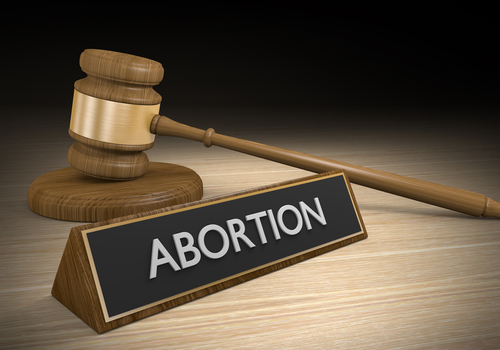9th Circuit allows challenge to law banning abortions based on genetic abnormality

Abortions are legal in Arizona for up to 15 weeks of pregnancy, although several restrictions apply, according to Bloomberg Law. Image from Shutterstock.
A federal appeals court ruled Monday that two reproductive health doctors have standing to challenge an abortion law that bans abortions conducted solely because of a genetic abnormality of a fetus.
The 9th U.S. Circuit Court of Appeals at San Francisco said Arizona obstetrician-gynecologists Paul A. Isaacson and Eric M. Reuss have standing based on their economic interests in providing medical services.
Courthouse News Service, Bloomberg Law, Reuters and Law360 have coverage.
Abortions are legal in Arizona for up to 15 weeks of pregnancy, although several restrictions apply, according to Bloomberg Law.
The physicians contend that the law is unconstitutionally vague. It’s unclear what kinds of conditions amount to a genetic abnormality and how physicians should determine whether the abnormality is the sole reason for the abortion, they argue.
The law defines a genetic abnormality as the “presence or presumed presence of an abnormal gene expression in an unborn child, including a chromosomal disorder or morphological malformation occurring as the result of abnormal gene expression.” Physician violators face up to two years in prison.
Isaacson and Reuss say they aren’t performing abortions in which there is a genetic condition present because they don’t know whether it is the sole reason for the abortion.
The physicians allege economic losses fairly traceable to the statute, and they allege “imminent future injuries,” the 9th Circuit said in the Oct. 30 opinion by Judge Ronald M. Gould, a nominee of former President Bill Clinton.
At least one county intends to enforce the law, even though Arizona Attorney General Kris Mayes, a Democrat, has said she will not enforce it. The doctors also fear that their medical licenses could be at risk if they violate the law, and that they could be subjected to lawsuits by fathers who are authorized to sue.
A federal judge had held that the physicians didn’t have standing because they were not chilled from engaging in a constitutionally protected activity since the U.S. Supreme Court overturned the right to abortion in June 2022.
The 9th Circuit disagreed, saying the trial judge was using a test in free speech challenges, even though the physicians’ void-for-vagueness challenge is rooted in the due process clause.
“And an imminent threat to life, liberty or property interests without due process of law, in violation of the Fifth and 14th Amendments, is a cognizable injury,” the appeals court said.
The doctors are represented by the Center for Reproductive Rights.
The case is Isaacson v. Mayes.



